

The Psychology of Communities – 4 Factors that Create a “Sense of Community” My entire life, I’ve always been fascinated by the power of communities.

More recently I’ve started to wonder about why it is that humans come together in such a unique way. Why do people participate in communities? What is it that makes a community exist? They don’t just sprout up for no reason. There must be psychological justifications that explain what it is that brings people together. Looking at research conducted to date, there’s one theory that has held up against the test of time and a great deal of research. In 1986, social psychologists McMillan & Chavis formed this theory that has become the most widely accepted understanding of how communities work. They called it the “Sense of Community”. They described their theory in one sentence: “Sense of community is a feeling that members have of belonging, a feeling that members matter to one another and to the group, and a shared faith that members’ needs will be met through their commitment to be together (McMillan, 1976). 1. 1. 2. 3.
The 5 elements of Working Out Loud. Working Out Loud Update: Working Out Loud is now available on Amazon.

Recently, I was talking with my wife about Working Out Loud and the book that I’m publishing later this year. After a few minutes, she bluntly asked me: “So, is it just blogging?” Educator as a Social Networked Learner. Theoretical Background - Social Networked Learning. Connectivism and Communities of Practice. The term Knowledge Management has traditionally referred to ongoing efforts to harness explicit and tacit knowledge within an organisation while 'organisational learning' tends to be more focussed on static efforts to meet specific learning objectives.
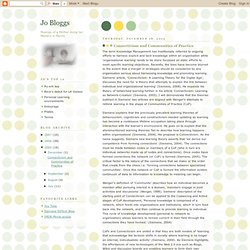
Recently, the lines have become blurred to the extent that a merger in strategies should be considered by any organisation serious about harnessing knowledge and promoting learning. Siemens' article, 'Connectivism: A Learning Theory for the Digital Age', discusses the need for 'a theory that attempts to explain the link between individual and organizational learning' (Siemens, 2004). He expands his theory of networked learning further in his article ‘Connectivism: Learning as Network-Creation’ (Siemens, 2005). I will demonstrate that the theories outlined in Siemens’ two articles are aligned with Wenger’s attempts to rethink learning in the shape of Communities of Practice (CoP). References: Pór. Siemens. Theoretical Background - Social Networked Learning. Theoretical Background - Social Networked Learning. Transformational Leadership - Becoming an Inspirational Leader. Becoming an Inspirational Leader Transformational leaders inspire and support their people. © iStockphoto/aydinmutlu Molly is someone everyone respects.
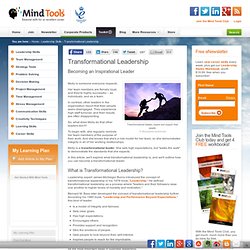
Her team members are fiercely loyal, and they're highly successful – as individuals, and as a team. In contrast, other leaders in the organization report that their people seem disengaged. So, what does Molly do that other leaders don't? To begin with, she regularly reminds her team members of the purpose of their work. Molly is a transformational leader. In this article, we'll explore what transformational leadership is, and we'll outline how you can become a transformational leader.
What is Transformational Leadership? Leadership expert James McGregor Burns introduced the concept of transformational leadership in his 1978 book, "Leadership. " Bernard M. Is a model of integrity and fairness. More than 25 years after Bass' book, transformational leadership is often argued to be the most important ideas in business leadership. Note: Tip: Key Points. Personalized Learning Plans for Teachers. Jean Lave, Etienne Wenger and communities of practice.
Contents: introduction · communities of practice · legitimate peripheral participation and situated learning · learning organizations and learning communities · conclusion · references · links · how to cite this article Many of the ways we have of talking about learning and education are based on the assumption that learning is something that individuals do.
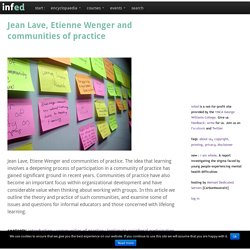
Furthermore, we often assume that learning ‘has a beginning and an end; that it is best separated from the rest of our activities; and that it is the result of teaching’ (Wenger 1998: 3). But how would things look if we took a different track? Net.educause.edu/ir/library/pdf/nli0531.pdf. The PLP model: Research-based professional learning. A vast body of literature underlies the connected learning communities model — our three-pronged approach at Powerful Learning Practice.
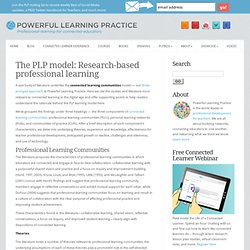
Here we cite the studies and literature most relevant to connected learning in the digital age and offer supporting points to help readers understand the rationale behind the PLP learning model here. We’ve grouped the findings under three headings — the three components of connected learning communities: professional learning communities (PLCs), personal learning networks (PLNs), and communities of practice (CoPs). After a brief description of each component’s characteristics, we delve into underlying theories, experience and knowledge, effectiveness for teacher professional development, anticipated growth or decline, challenges and dilemmas, and use of technology.
Connected Learning Principles. We are living in a historical moment of transformation and realignment in the creation and sharing of knowledge, in social, political and economic life, and in global connectedness.
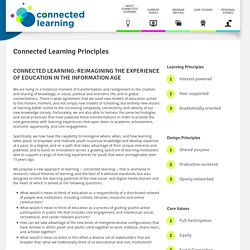
There is wide agreement that we need new models of education suited to this historic moment, and not simply new models of schooling, but entirely new visions of learning better suited to the increasing complexity, connectivity, and velocity of our new knowledge society. Fortunately, we are also able to harness the same technologies and social processes that have powered these transformations in order to provide the next generation with learning experiences that open doors to academic achievement, economic opportunity, and civic engagement.
Connected Learning Principles. Citeseerx.ist.psu.edu/viewdoc/download?doi=10.1.1.125.5604&rep=rep1&type=pdf. Wp-content/uploads/2012/01/09-10-27-CoPs-and-systems-v2.0.pdf. Aea8 - EduVision. Using eCurriculum to Change Instruction PSA PL Jennifer Sigrist, Director of Teaching & Learning at Van Meter (IA) Schools, talks about Iowa's innovative approach to developing high quality, conceptual-based digital teaching modules through the collective efforts of the Iowa Communities of Practice and Innovation (IACoPi) project.

" 31551 IA_FortDodge_aea8_aea8_359/psa_815166ea4c6440b1999f6b81cfe79c37_converted_flvconverted.mp4 PLAEA Board Meeting April 21, 2014 PL This is the monthly meeting of the Prairie Lakes AEA Board of Directors, held April 21, 2014 in Pocahontas, Iowa. 88629 IA_FortDodge_aea8_aea8_359/april_2014_board_meeting_25316c1e3bc547ab974429746ecfc6a8_flvconverted.mp4 Using Video Slimmer on the iPad PL Trying to upload a video shot with an iPad can be frustrating.
Because an iPad shoots video in high definition, the file size is enormous. Preparing for Download... Video file is missing. Please contact your site administrator. Using eCurriculum to Change Instruction PSA. Hybrid PD supported by online ‘communities of practice’ With the many professional educational technology resources available to the K12 community today, it’s imperative that we transition from episodic and ineffective models to an interactive environment that is digitally-based and connected 24/7.
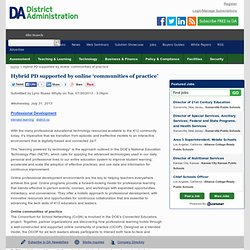
This “learning powered by technology” is the approach outlined in the DOE’s National Education Technology Plan (NETP), which calls for applying the advanced technologies used in our daily personal and professional lives to our entire education system to improve student learning; accelerate and scale the adoption of effective practices; and use data and information for continuous improvement. Online professional development environments are the key to helping teachers everywhere achieve this goal. Online programs provide a forward-looking model for professional learning that blends effective in-person events, courses, and workshops with expanded opportunities, immediacy, and convenience.
Www.carnegiefoundation.org/sites/default/files/bryk-gomez_building-nics-education.pdf. List of resources. Documents/CoP-Collection/CoP-Guidebook.pdf. Report/files/2011/03/COCP-Connect-report-draft-201103.pdf. Betreat.wikispaces.com/file/view/SLL Certificate Portfolio Outline.pdf/442134882/SLL Certificate Portfolio Outline.pdf. Www.inacol.org/cms/wp-content/uploads/2013/06/inacol_OER_Collaborative_Guide_v5_web.pdf. Jean Lave, Etienne Wenger and communities of practice.